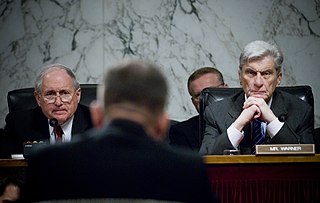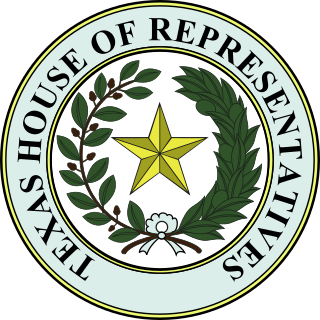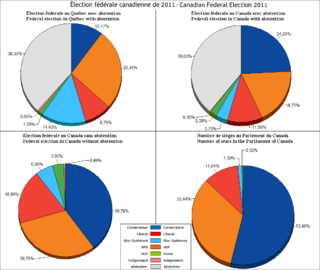
The positions of majority leader and minority leader are held by two United States senators and people of the party leadership of the United States Senate. They serve as chief spokespersons for their respective political parties, holding the majority and the minority in the United States Senate. They are each elected as majority leader and minority leader by the senators of their party caucuses: the Senate Democratic Caucus and the Senate Republican Conference.

Cloture, closure or, informally, a guillotine, is a motion or process in parliamentary procedure aimed at bringing debate to a quick end.

The Georgia General Assembly is the state legislature of the U.S. state of Georgia. It is bicameral, consisting of the Senate and the House of Representatives.

A congressional committee is a legislative sub-organization in the United States Congress that handles a specific duty. Committee membership enables members to develop specialized knowledge of the matters under their jurisdiction. As "little legislatures", the committees monitor ongoing governmental operations, identify issues suitable for legislative review, gather and evaluate information, and recommend courses of action to their parent body. Woodrow Wilson once wrote, "it is not far from the truth to say that Congress in session is Congress on public exhibition, whilst Congress in its committee rooms is Congress at work." It is not expected that a member of Congress be an expert on all matters and subject areas that come before Congress. Congressional committees provide valuable informational services to Congress by investigating and reporting about specialized subjects.

The Committee on Agriculture, Nutrition, and Forestry is a committee of the United States Senate empowered with legislative oversight of all matters relating to the nation's agriculture industry, farming programs, forestry and logging, and legislation relating to nutrition, home economics, and rural development.

The Texas House of Representatives is the lower house of the bicameral Texas Legislature. It consists of 150 members who are elected from single-member districts for two-year terms. There are no term limits. The House meets at the State Capitol in Austin.

The Senate Republican Conference is the formal organization of the Republican senators in the United States Senate. Over the last century, the mission of the conference has expanded and been shaped as a means of informing the media of the opinions and activities of Senate Republicans. The Senate Republican Conference assists Republican senators by providing a full range of communications services including graphics, radio, television, and the Internet. Its chairman is Senator John Barrasso, and its vice chairwoman is Senator Shelley Moore Capito.
In United States parliamentary procedure, a discharge petition is a means of bringing a bill out of committee and to the floor for consideration without a report from the committee by "discharging" the committee from further consideration of a bill or resolution. The signatures of an absolute majority of House members are required.

Abstention is a term in election procedure for when a participant in a vote either does not go to vote or, in parliamentary procedure, is present during the vote but does not cast a ballot. Abstention must be contrasted with "blank vote", in which a voter casts a ballot willfully made invalid by marking it wrongly or by not marking anything at all. A "blank voter" has voted, although their vote may be considered a spoilt vote, depending on each legislation, while an abstaining voter has not voted. Both forms may or may not, depending on the circumstances, be considered to be a protest vote. Abstention is related to political apathy and low voter turnout.
In parliamentary procedure, unanimous consent, also known as general consent, or in the case of the parliaments under the Westminster system, leave of the house, is a situation in which no member present objects to a proposal.
The Standing Rules of the Senate are the parliamentary procedures adopted by the United States Senate that govern its procedure. The Senate's power to establish rules derives from Article One, Section 5 of the United States Constitution: "Each House may determine the rules of its proceedings ..."
A committee of the whole is a meeting of a legislative or deliberative assembly using procedural rules that are based on those of a committee, except that in this case the committee includes all members of the assembly. As with other (standing) committees, the activities of a committee of the whole are limited to considering and making recommendations on matters that the assembly has referred to it; it cannot take up other matters or vote directly on the assembly's business. The purpose of a committee of the whole is to relax the usual limits on debate, allowing a more open exchange of views without the urgency of a final vote. Debates in a committee of the whole may be recorded but are often excluded from the assembly's minutes. After debating, the committee submits its conclusions to the assembly and business continues according to the normal rules.
The committees of the Australian Senate are committees of Senators, established by the Australian Senate, for purposes determined by that body. Senate committees are part of the operation of the Australian parliament, and have for some decades been involved in maintenance of government accountability to the Australian parliament, particularly through hearings to scrutinise the budget, and through public inquiries on policy questions.
In the United States Senate, a hold is a parliamentary procedure permitted by the Standing Rules of the United States Senate which allows one or more Senators to prevent a motion to proceed with consideration of a certain manner from reaching a vote on the Senate floor, as no motion may be brought for consideration on the Senate floor without unanimous consent.
In parliamentary procedure, a motion is a formal proposal by a member of a deliberative assembly that the assembly take a particular action. These may include legislative motions, budgetary motions, supplementary budgetary motions, and petitionary motions.

The United States Senate is the upper chamber of the United States Congress. The Senate and the United States House of Representatives comprise the federal bicameral legislature of the United States. Together, the Senate and the House have the authority under Article One of the U.S. Constitution to pass or defeat federal legislation. The Senate has exclusive power to confirm U.S. presidential appointments to high offices, approve or reject treaties, and try cases of impeachment brought by the House. The Senate and the House provide a check and balance on the powers of the executive and judicial branches of government.

A filibuster is a tactic used in the United States Senate to delay or block a vote on a measure by preventing debate on it from ending. The Senate's rules place few restrictions on debate; in general, if no other senator is speaking, a senator who seeks recognition is entitled to speak for as long as they wish. Only when debate concludes can the measure be put to a vote.

Procedures of the United States Congress are established ways of doing legislative business. Congress has two-year terms with one session each year. There are rules and procedures, often complex, which guide how it converts ideas for legislation into laws.
A "vote-a-rama" is a procedure in the United States Senate that allows senators to propose an unlimited number of amendments to budget-related measures. After brief debate, the amendments are each voted on in rapid succession.

In the United States, federal impeachment is the process by which the House of Representatives charges the president, vice president, or another civil federal officer for alleged misconduct. The House can impeach an individual with a simple majority of the present members or other criteria adopted by the House according to Article One, Section 2, Clause 5 of the U.S. Constitution.











